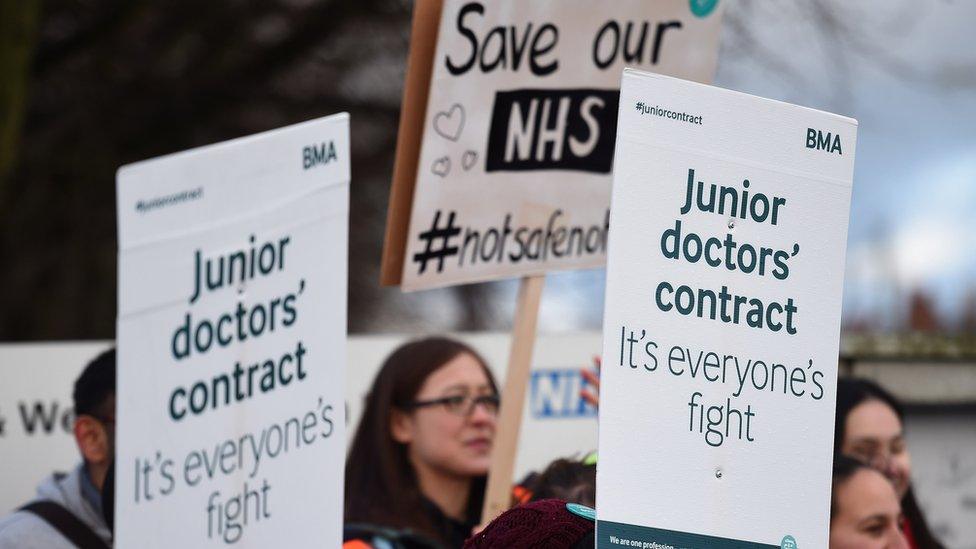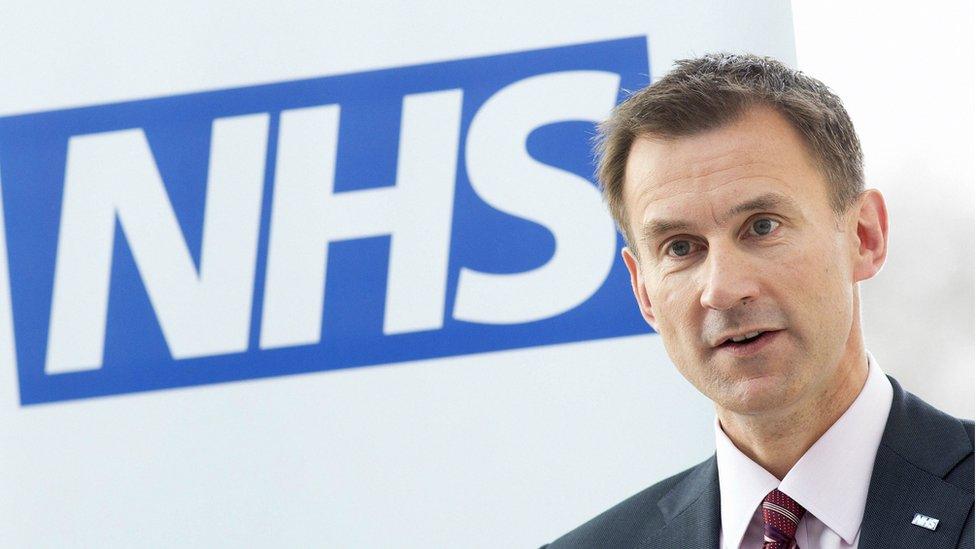Junior doctors - what chance of resolving the dispute?
- Published

The heat and noise of strike day have eased. Junior doctors are back at work. The government negotiating team and the British Medical Association leaders are sitting around the table again.
So what are the chances of an agreement which might mean that at least the final planned strike day does not go ahead?
The fact that talks - overseen by the conciliation service ACAS - have resumed quickly is a positive sign. There have been no substantive talks since before Christmas.
The brief encounter between the two sides on the first working day of this year did not last long. NHS Employers and the Department of Health negotiators presented a new proposal to address doctors' concerns about being made to work excessive hours.
But there was no discussion around it, with the BMA dismissing the plan as insufficient before announcing the three sets of strike days.
There is a sense that having got the first strike out of the way the air has been cleared a little and the scope for serious discussion is stronger.
The BMA argued that support was solid and that the figure of 39% of junior doctors working on the strike day was irrelevant, as it represented those due to work anyway in emergency and urgent care.
Improving services 'laudable'
Central to the process with be Sir David Dalton, chief executive of Salford Royal Infirmary.
He has entered the fray to head up the government team, alongside Danny Mortimer of NHS Employers.
In an interview with Health Service Journal (HSJ), Sir David said there were "inequities" in the current contract in terms of staff payment, meaning that it was not suitable.
The ambition of improving services at weekends, he said was "laudable".

What is the dispute about?
The row between junior doctors and the government is over a new contract
Talks broke down in 2014, but the dispute has escalated since the summer after ministers said they would impose the deal
Ministers offered doctors an 11% rise in basic pay last year, but that was offset by curbs to other elements of the pay package, including payments for unsociable hours - they have maintained there is not extra money for junior doctor pay
The government says the changes are needed to create more seven-days services, but the BMA warns safeguards to keep a lid on excessive hours are being weakened and also has concerns about career progression and weekend pay
A 48-hour strike is scheduled for Tuesday, 26 January - emergency cover will be provided
An all-out junior doctors' strike is planned for Wednesday 10 February - emergency cover will not be provided

But Sir David went on to point out, in effect, that junior doctors were the group in the NHS which had to contribute "least" beyond current working practices because they were already on rota to work at weekends.
The government messaging on this issue "has got muddled", he added, and had led to the perception that junior doctors were being criticised.
Sir David acknowledged in his HSJ interview that the strike had reinforced for the BMA that it had a mandate and support. But he said it was now time for "lowering of the temperature", and for both sides to move away from extremes because there was "much where agreement could be reached relatively smoothly".
Echoing the views of other NHS leaders, he said the planned one-day strike in February by junior doctors covering emergency care would be "disastrous" and if no agreement was reached by then a "war of attrition" would follow.
The BMA line is that it will work as hard as possible to secure a settlement, but if that's not reached in the next few weeks the February strike will take place.
Members are adamant that consultants will cover those out on strike so that a secure level of emergency care is maintained.
One of them tweeted arguing that on February 10th emergency patients would be cared for by "the most experienced doctors in NHS history".
Time 'of the essence'
Hovering over the negotiations is the threat to impose the new contract.
Jeremy Hunt has always made clear that is the option he would take if negotiations ran into the sand.

Health Secretary Jeremy Hunt has said throughout the dispute that imposing a new contract is an option
Government sources say there was "full and robust" support this week at Cabinet for that stance.
Ministers see the "seven day NHS" as important and popular, and they continue to argue that changes to junior doctors' and consultants contracts are required to support the policy.
They no doubt believe they are taking on a vested interest and powerful trade union.
For its part, the BMA has questioned how a new contract could be imposed given the complexity of medical employment terms and conditions.
If the BMA urged a boycott of the new contract, it argues, it is hard to see how trusts could turn to alternative sources of labour when recruiting doctors to fill vacant positions.
The rhetoric has been toned down and the talks have begun. No one involved doubts there is a lot at stake - and time is of the essence.
- Published5 January 2016
